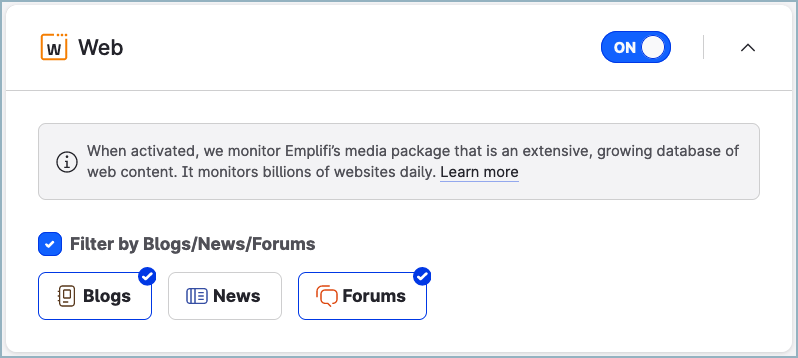Listening Data Sources and Covered Content
Supported data sources
You can listen for data from the following sources:
Facebook
Instagram
Reddit
 Reddit as a data source is available as an add-on. To have it enabled for your Emplifi account, contact your Customer Success Manager or Emplifi Support at support@emplifi.io.
Reddit as a data source is available as an add-on. To have it enabled for your Emplifi account, contact your Customer Success Manager or Emplifi Support at support@emplifi.io.TikTok
X (formerly Twitter)
YouTube
Web
Downloading and processing listening data
Every source is crawled at least once every 24 hours after publishing, and some of them are crawled every hour. Emplifi requests the crawled data for new mentions in a dynamically changing frequency. Listening queries receiving a lot of mentions provide new mentions every hour, while some niche queries can be refreshed in up to every 12 hours.
Historical backfill is available for all data sources except for Instagram hashtags, Reddit, and TikTok.
For more information, see Downloading and Processing Listening Data.
The scope of data sources
When setting up a listening query, define what scope of data from each data source you want to monitor.
Wide range listening
This is the widest possible scope of data to monitor where you can select one or more supported data sources (the social media platforms and web).
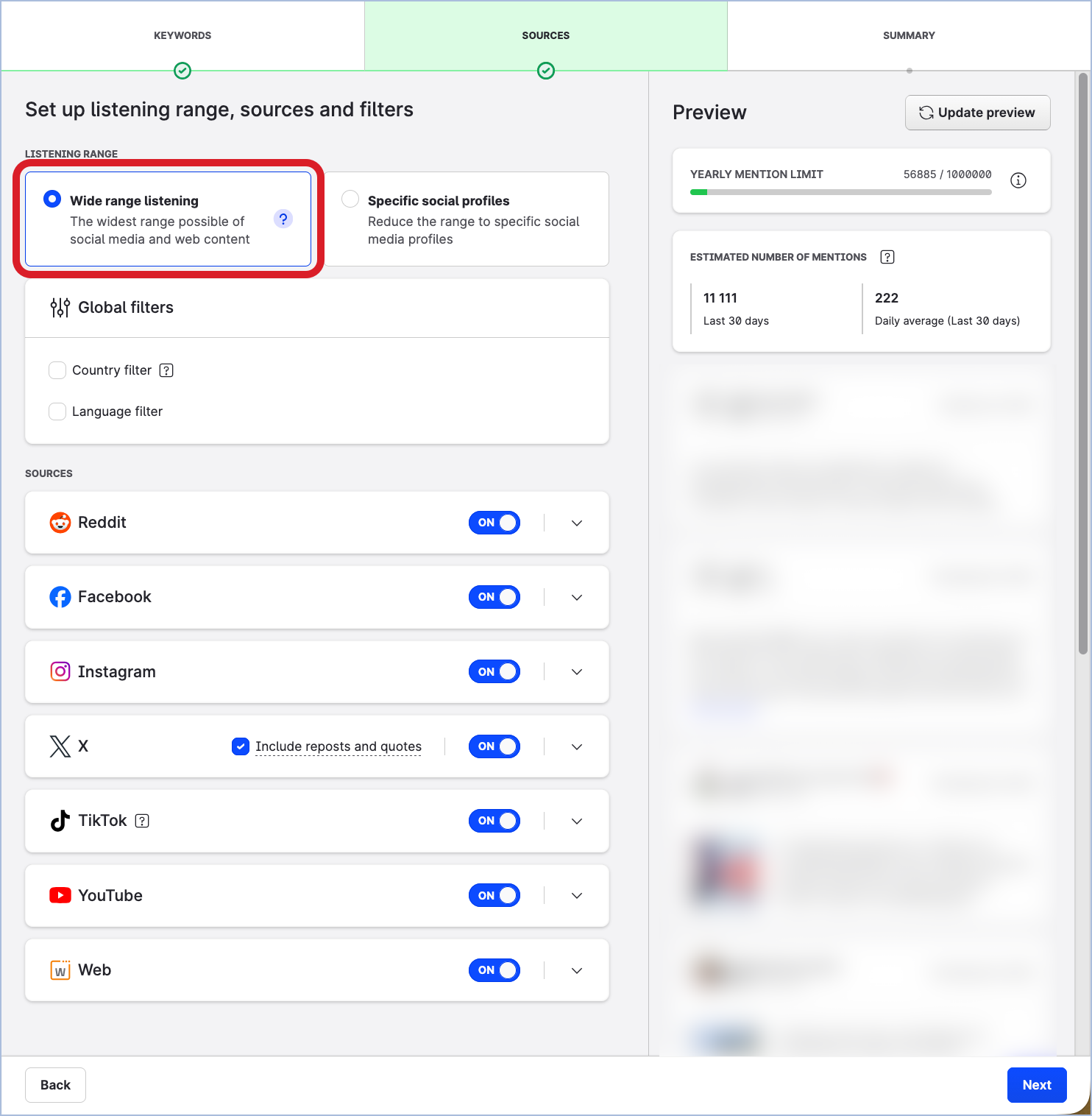
To narrow down the results, you can apply global filters to the selected data sources:
Filtering by language
Filtering by country
 Filtering by country is not available for Reddit and TikTok.
Filtering by country is not available for Reddit and TikTok.
Reddit as a data source is available as an add-on. To have it enabled for your Emplifi account, contact your Customer Success Manager or Emplifi Support at support@emplifi.io.
Limitations of filtering by country
Determining the country of a social media account or a website relies on the following:
Public information about the location that the relevant social media account or a website decided to disclose,
The query capabilities of the social media platform or a web site. While Emplifi requests the location data, it is solely the social media platform or the website who decides what data to return.
Emplifi cannot independently verify the accuracy of location data obtained from third-parties as described above and therefore assumes no liability for the accuracy of location data.
Social media accounts or websites lacking public location data are not included in the results at all.
For each selected social media platform except for Reddit and TikTok, you can also specify the profiles that should be excluded from listening.
Reddit as a data source is available as an add-on. To have it enabled for your Emplifi account, contact your Customer Success Manager or Emplifi Support at support@emplifi.io.
Specific social profiles
Explicitly specify the accounts on the social media platforms that you want to monitor. Those can be the accounts that you added to your Emplifi account as profiles (see Add a Profile as Owned (Private) or Public or any other accounts that you can find by their name or URL.
Specifying the accounts that you want to monitor is not available for Reddit and TikTok.
(Reddit as a data source is available as an add-on. To have it enabled for your Emplifi account, contact your Customer Success Manager or Emplifi Support at support@emplifi.io.)
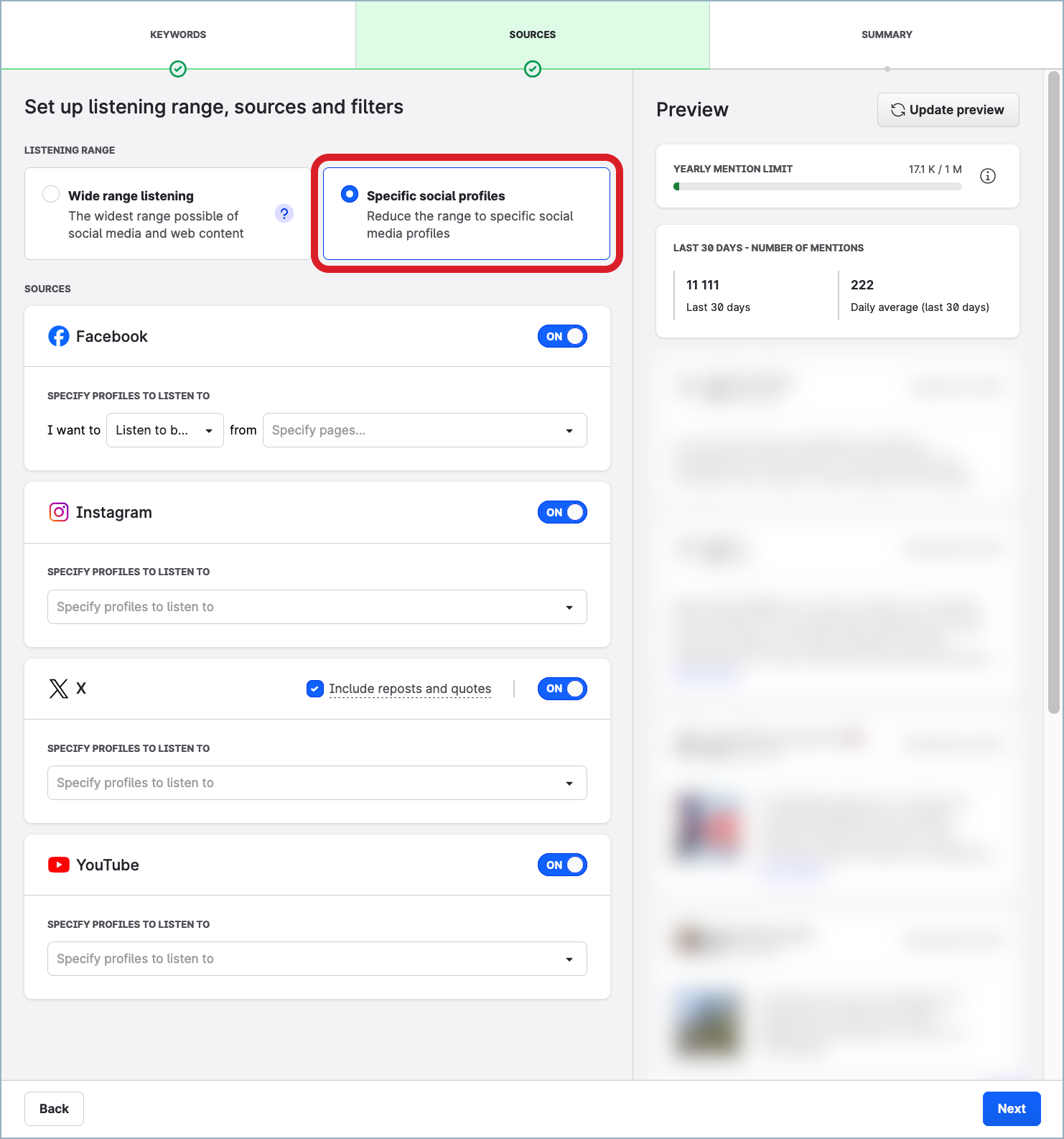
Data sources
The Facebook data source is an extensive, growing database of social media content. It includes billions of posts from more than 800,000 Facebook pages, but still not all Facebook content.
If there is a specific Facebook page that you want to monitor but you do not see listening mentions collected from this page among your query results, contact Emplifi Support at support@emplifi.io to have the page added to the Facebook data source database.
What is collected
Posts (except for ad posts)
User posts
Comments
Data availability
The data is collected almost in real time. The listening mentions are available for analysis no later than an hour after the content has been published. Data starts gathering from the point a query is set, up to 365 days in the past. For more information, see Downloading and Processing Listening Data.
Configure the data source
Here is how you set up the Facebook data source with the Wide range listening option or the Specific social profiles option selected, correspondingly (see “The scope of data sources” earlier in this article):
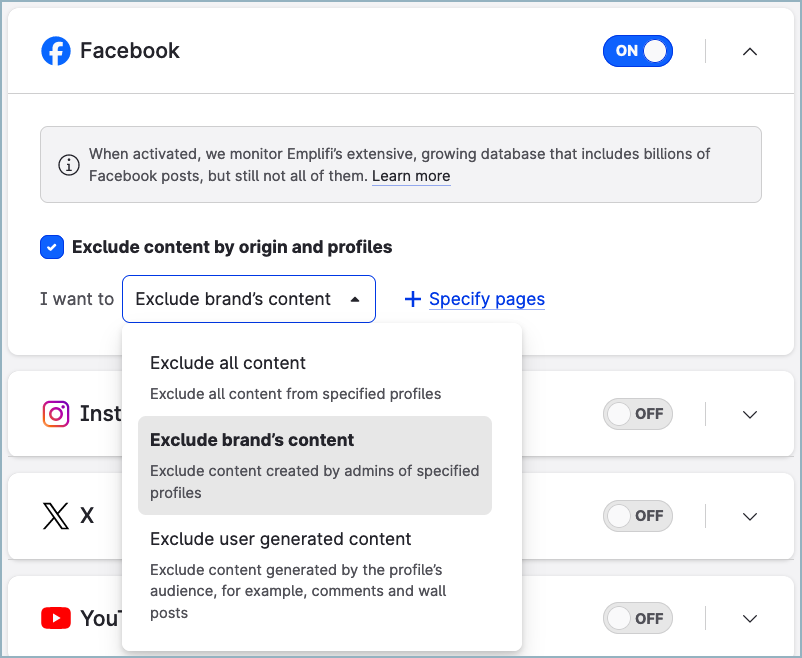
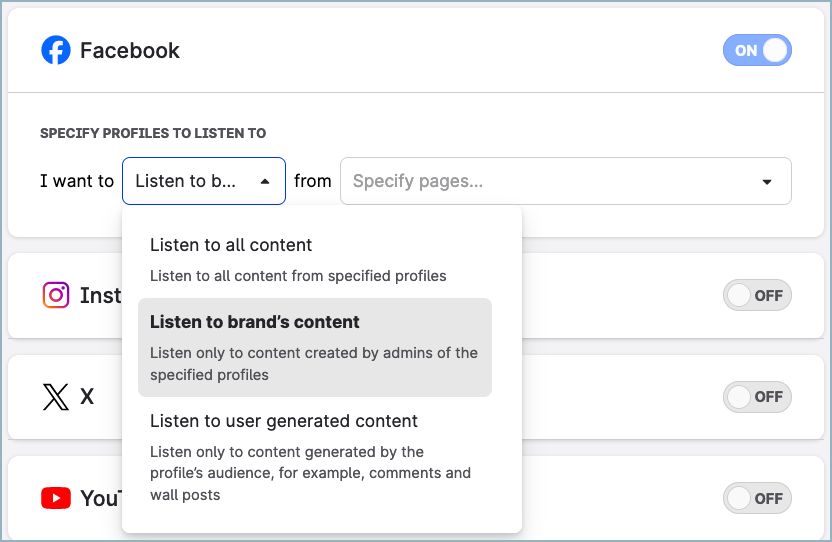
The Instagram data source is an extensive, growing database of social media content. It includes billions of posts from more than 9,000,000 Instagram Business and Creator accounts, but still not all Instagram content.
If there is a specific Instagram account that you want to monitor but you do not see listening mentions collected from this account among your query results, contact Emplifi Support at support@emplifi.io to have the account added to the Instagram data source database.
You can include Instagram hashtags in the scope of the monitored data. Instagram hashtag search is a way of getting access to Instagram public content tagged with a specific hashtag. It searches in the content of Business and Creator accounts and also personal accounts that are public. For more information, see Listening - Instagram Hashtag Search.
What is collected
Posts (comments are not included)
Reels (comments are not included)
Listening for owned profiles
For Instagram accounts that are added to your Emplifi account as owned profiles and are activated for Community (see Add an Owned Profile for Your Instagram Account and Activate Profiles for Community and Set Up Profile Roles), we collect:
Posts where the account is tagged via a media tag
Posts and comments where the account is mentioned via an @mention
Comments under the account’s posts
Data availability
The frequency of collecting the data depends on the data type:
The listening mentions coming from the hashtag search are shown immediately after a post with the hashtags is published.
For the other data types, see Downloading and Processing Listening Data.
Data starts gathering from the point a query is set, up to 365 days in the past. For more information, see Downloading and Processing Listening Data.
Historical backfill is not available for:
Hashtag search
Comments where the account is mentioned via an @mention
Comments under the account’s posts
Configure the data source
Here is how you set up the Instagram data source with the Wide range listening option or the Specific social profiles option selected, correspondingly (see “The scope of data sources” earlier in this article):
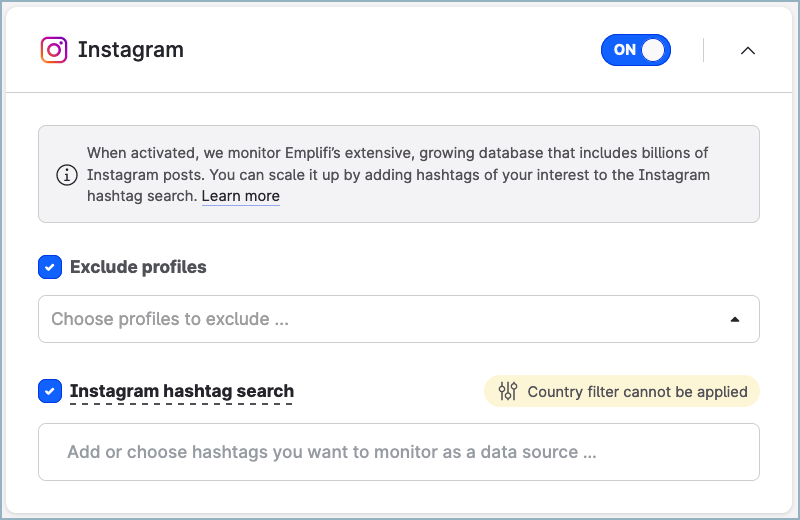

Reddit as a data source is available as an add-on. To have it enabled for your Emplifi account, contact your Customer Success Manager or Emplifi Support at support@emplifi.io.
You can access all public Reddit content.
What’s collected
Posts
Comments
Data availability
The data is collected in real time, and the listening mentions are available for analysis immediately after the content has been published. Data starts gathering from the point a query is set. For more information, see Downloading and Processing Listening Data.
No backfill
Reddit has no historical backfill.
Reddit’s data policies and data availability
Per Reddit’s policies, any third party that uses Reddit data (including Emplifi and our competitors) cannot redistribute Reddit data and must delete any data from their systems when this data is deleted from Reddit itself. This is how this may affect you:
When content is deleted from Reddit, Emplifi deletes it from their systems. The deleted data will no longer be available in the Content module and Unified Analytics module, which may affect your reporting and analytical data.
Exporting Reddit data from the Content module is disabled.
Configure the data source
Here is how you set up the Reddit data source with the Wide range listening option (see “The scope of data sources” earlier in this article). The Specific social profiles option is not available.

TikTok
On TikTok, the listening algorithm listens for @mentions of your TikTok accounts in other TikTok users' posts and comments.
Due to the TikTok API limitations, to appear in the results of a listening query:
A post with a @mention of your account must be one of the top 1000 most liked posts out of all the posts that mention your TikTok account.
A comment with a @mention of your account must be one of the top 1000 most liked comments out of all the comments that mention your TikTok account.
For listening queries to be able to collect posts and comments with mentions, your TikTok accounts must be added to your Emplifi account as owned profiles (see Add an Owned Profile for Your TikTok Account) and the UGC and Listening connection must be established in these profiles (see Check and Establish Connections of Owned Profiles).
What is collected
Posts and comments where the account is mentioned via an @mention
If a collected post is a photo post (a post with a photo carousel), the thumbnail image is not fetched due to TikTok API limitations and therefore will not be displayed when the post is reviewed in the Content module.
Data availability
The data is collected every 24-48 hours. For more information, see Downloading and Processing Listening Data.
TikTok has no historical backfill.
Configure the data source
Here is how you set up the TikTok data source with the Wide range listening option (see “The scope of data sources” earlier in this article). The Specific social profiles option is not available.
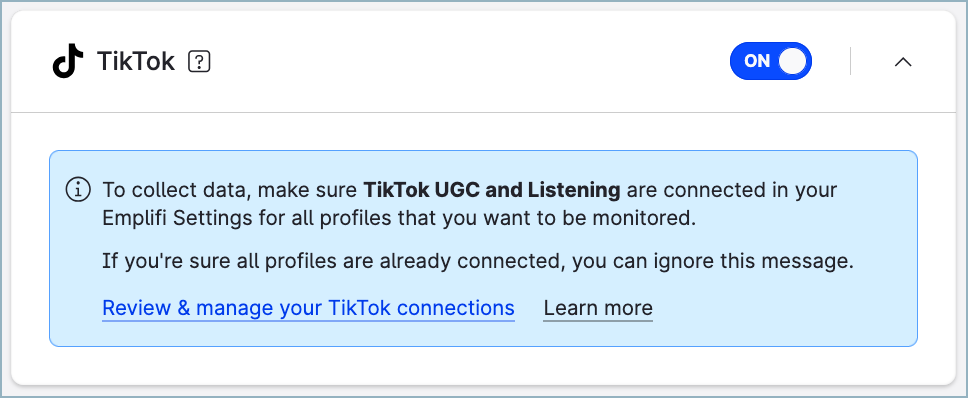
X (formerly Twitter)
Because X (formerly Twitter) works differently than other social media platforms, you can access all public X content without any limitations.
What’s collected
Posts (formerly “tweets”)
Replies
Mentions
Reposts (formerly “retweets”)
Reposts with comment (formerly “quote tweets”)
 Only when a query keyword is included in the comment to the reposted post (and not in the post itself)
Only when a query keyword is included in the comment to the reposted post (and not in the post itself)
Data availability
The data is collected in real time, and the listening mentions are available for analysis immediately after the content has been published. Data starts gathering from the point a query is set, up to 365 days in the past. For more information, see Downloading and Processing Listening Data.
Configure the data source
Here is how you set up the X data source with the Wide range listening option or the Specific social profiles option selected, correspondingly (see “The scope of data sources” earlier in this article):
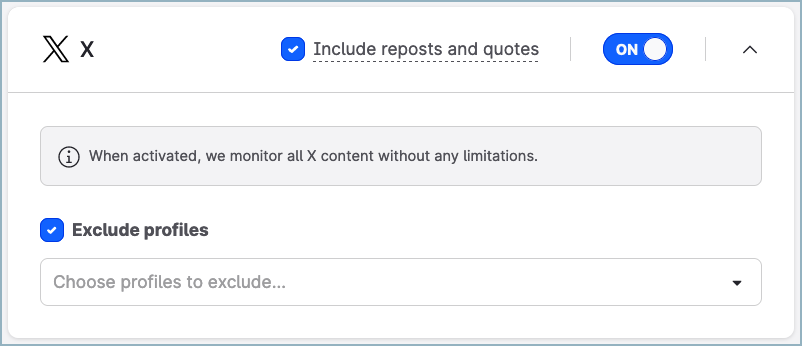

YouTube
The YouTube data source is an extensive, growing database of social media content. It includes billions of posts from more than 3,000,000 YouTube channels pages, but still not all YouTube content.
If there is a specific YouTube channel page that you want to monitor but you do not see listening mentions collected from this channel page among your query results, contact Emplifi Support at support@emplifi.io to have the channel page added to the YouTube data source database.
What is collected
Videos (the title and description are included)
Shorts
Data availability
The data is collected almost in real time, and the listening mentions are available for analysis no later than two hours after the content has been published. Data starts gathering from the point a query is set, up to 365 days in the past. For more information, see Downloading and Processing Listening Data.
Configure the data source
Here is how you set up the YouTube data source with the Wide range listening option or the Specific social profiles option selected, correspondingly (see “The scope of data sources” earlier in this article):
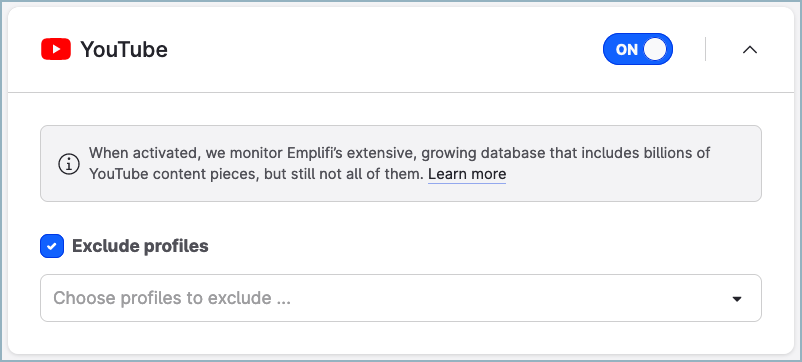

Web
The web data source is an extensive, growing database of web content. It scans and extracts data from over a million websites every day and over 10 million posts are indexed daily.
If you want to know whether a certain domain is covered, contact Emplifi Support at support@emplifi.io.
What is collected
News
Articles published in established news media outletsBlogs
Articles published by self-published authorsForums
Online discussions, conversation threads on message boards, forums, and review sites
Data availability
The data is collected with a dynamically changing frequency. For more information, see Downloading and Processing Listening Data.
Configure the data source
The web data source is available only with the Wide range listening option selected (see “The scope of data sources” earlier in this article):
